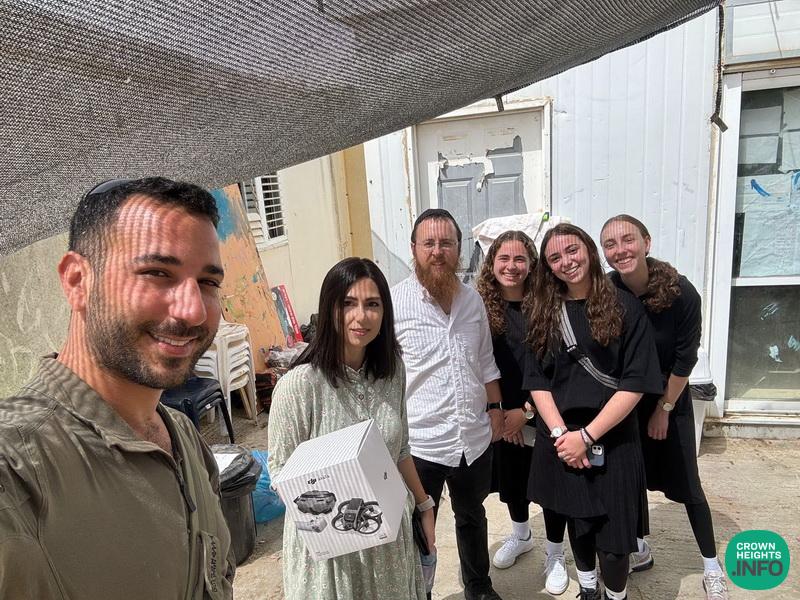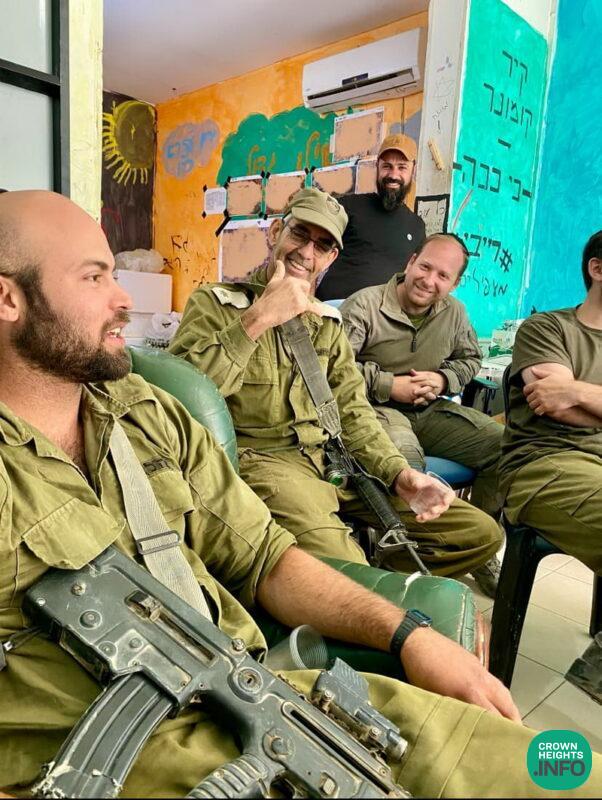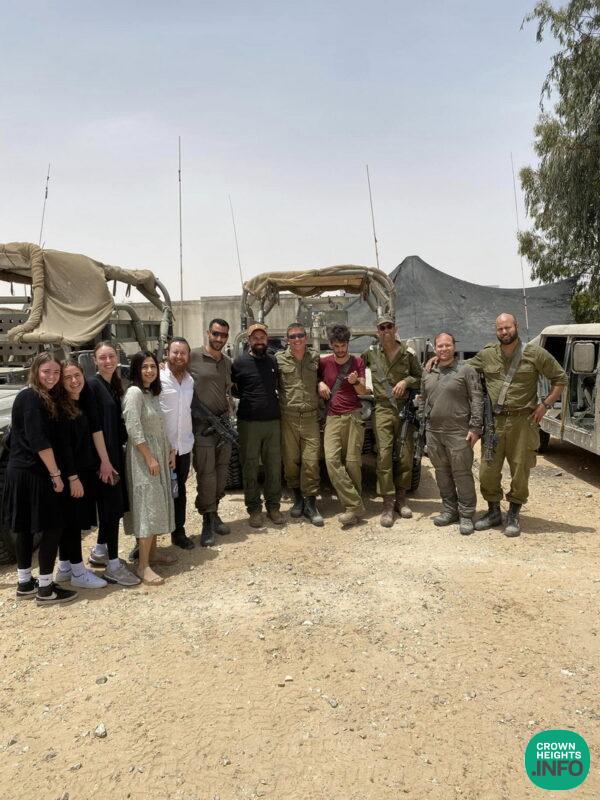
The Jeeps Were Lined Up In Neat Rows, This Was Not Your Normal IDF Base
by Bruria Efune
We pulled up to the base, and instantly noticed a number of things that were different from the usual.
It was just as sandy and hot as most southern bases this time of year, but first of all, it wasn’t an actual base. It was a small company of soldiers staying in a home at the outskirts of a tiny border town. It wasn’t really a home either, it was a Bnei Akiva youth clubhouse, in which all the walls were painted in many bright and dramatic colors, with illustrations cheering for the local team.
But what we definitely hadn’t seen anywhere else, was the neatly organized parking spots for the IDF Jeeps, with improvised poles and ropes set up to mark each vehicle’s space. It was a slightly humorous sign that these guys were not your typical young soldiers.
We hopped out of the car, My husband and I and three guests, and were welcomed by Elchanan, to whom we handed a drone. His team would deliver it to a unit on the frontlines in Rafah that night.

Elchanan introduced himself as the team commander, but only since the last couple of months. He’s a reservist, originally from a Givati special forces unit, who he fought with until he got injured in battle in Khan Younis. An attack led a building to collapse on him, and killed two soldiers who stood at his side. He survived with an injured shoulder and a lot of stitches.
Elchanan could have stayed home once he was released from the hospital, but after all the battles he fought in, since the very first day on October 7th, and after losing his friends to the war, he couldn’t let himself leave before the job was done. So he returned to the army to command a unit of slightly lower combat intensity—though not without risk.
Elchanan, at 30-years-old, is one of the younger guys in the team of 20 under his command. He’s a mortgage broker with a huge smile and sunglasses that rest perfectly in his head. He says he has one and a half kids—the half meaning that his wife is pregnant and he’s eagerly awaiting kid number two’s arrival. The drone wasn’t for his own unit, but he was still thrilled to be able to deliver it, and immediately pulled out his phone for a group selfie with the drone at center.
Inside, we met the others. There was Yossi, who has three daughters (girls are the best, he says, because their hearts belong to dad), the oldest 17, the youngest 11. He comes from a town in the north which has not yet been evacuated, but does get occasional sirens. His youngest used to get anxious from the sirens, so when he was home, he sat with her and with a timer, showed her how much can be done in 60 seconds. “That helped her relax,” he said.
When I asked if most of them have kids at home they nodded, and then pointed at Daniel. “He’s got 8 kids! His oldest will join him in the army soon.”
I looked at Daniel in shock and asked what he’s doing there. Fathers of large families are not expected to show up for reserve duty. His answer was so simple, but explained everything, and sent us all laughing.
“I’m from Yitzhar,” he said.
Yitzhar, home to the people who will go to all lengths to defend the Jewish Homeland. Daniel had to show up.
Meir, who is a regulator at the bank of Israel, has three kids at home. He says the toughest is his youngest child who just turned three, and is starting to understand what’s going on. “He keeps asking where Daddy is,” Meir sighed. “My wife is the real hero, holding fort at home.”
There were a bunch of professionals in the room, and I tried guessing which one of them had felt the need to shape designated parking spots for the jeeps.
Avi is a lawyer at the civil service commission. He told us he misses his job, and his computer at his desk, but honestly, he didn’t have to say that. We could tell he loves his job and misses that lifestyle by the way he happily spoke on and on about it, and by the way he still sat like a civil defense lawyer—upright, attentive, smiling, hands clutched together on his lap. Almost like a therapist, but one that was out to make sure you got your legal rights.
Aviad also confessed to being a lawyer, but said it’s his side gig. His main job is with at-risk teens, who he coaches to think higher of themselves, and prepare for better careers.
In between them sat Eshhar, who had caught my eyes immediately.
“You don’t look the same age as the other guys here,” I said, bordering on Israeli chutzpah. He looked like he could be my father’s age.
He grinned, and pointed to his gun strap. “It’s 40 years old, from when I was a young soldier.” Reserve duty ends at 40-years-old, but Eshhar never stopped going. “Not when we have work to do.”
Eshhar also clearly loves his job as a park ranger. Not only did he love telling us about it, but the other guys in the room were eager to fill in details too. They were well briefed about the springs and lakes and which type of park visitors were the worst polluters, vs the best people to go camping with.
Esshar didn’t take an easy job on reserve duty either. He’s one of the unit drivers.
Every night, the unit picks up logistical needs for IDF units fighting inside Gaza, and delivers it to them. Now they’re servicing the units in Rafah, bringing them ammunition, fuel, food, and other necessities.
It’s a frightening journey each time. They escort trucks carrying dangerous loads, and speed down dusty paths, where RPGs are frequently fired at them.
“We need to drive fast, so that we don’t get hit,” Eshhar explained. “But we also need to drive close together.”
The first vehicle makes a dust cloud, and the further behind it the next car is, the harder it is to see—after the third car, the only visibility is two tiny lights on top of the vehicle in front of them. So they drive tightly together. Elchanan leads at front.
“He needs to communicate everything,” Yossi explained. “If he says stop, all the drivers have to stop at the same exact second, otherwise we crash. But if they’re firing at us, we don’t stop. We speed through.”
If they’re fired on, soldiers in the jeeps wearing night vision goggles have to quickly spot the source of fire, and shoot them down. Worst case scenario can mean the ammunition load getting hit. Second worse can be the fuel truck.
“Just a couple days ago,” Elchanan added in, “a new vehicle joined us. They didn’t have as much practice, and got lost in the dust cloud. Then they turned off the wrong road, and in the pitch dark, just kept on driving. They were all alone making their way through southern Gaza.”
Elchanan called in a large military drone, whose team on ground found the jeep, and directed them back to the caravan. It was a close call. Elchanan’s team doesn’t have a drone of their own. Because they work exclusively at night, they need a thermal drone with night vision, which is more expensive than the drones used to search buildings. They feel it would help them prevent further incidents, and search the route for attackers so that they can be prepared before setting out.
“We lost two guys since the start of the war,” Avi told us. “It’s never easy.”

I still hadn’t figured out who made the neatly lined parking spots, but there was another thing different about this team.
“We re-enter every night,” Aviad said. “Each time we have to choose again to dive in to danger. Sometimes we set up a base and stay in Gaza for a few days, to set up solutions for units on long-term stays. But nothing is harder than that deep breath and prayer before speeding on to the dark cloudy road.”
“And the sigh of relief and thanks to G-d when we come back out in one piece,” added Meir.
I looked around at them. Almost every single soldier in the room was exempt from reserve duty. All of them could get out of it if they wanted to. But every day they keep choosing to step into the line of fire again.
When I ask why, they simply answer, “it’s our people. It’s our homeland. We can’t sit back and do nothing.”
—
Drones save the lives of soldiers in Gaza every day. Please help us buy more. Together with Chamal Gederot, we delivered 20 drones in the last week, and hope to deliver 40 more in the coming weeks.













